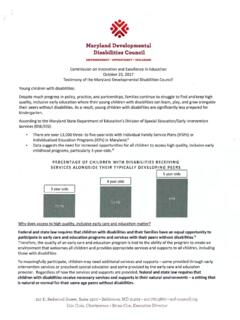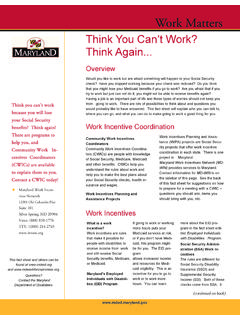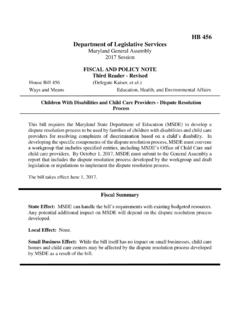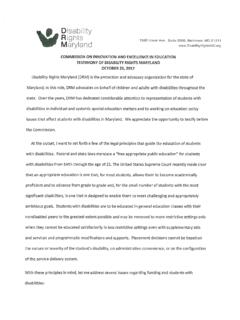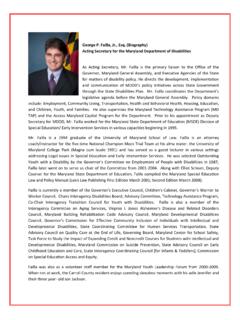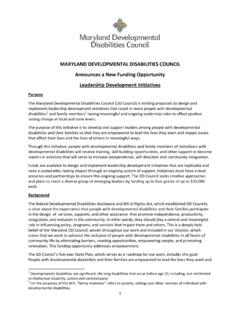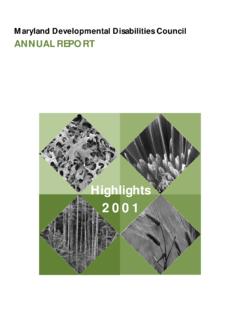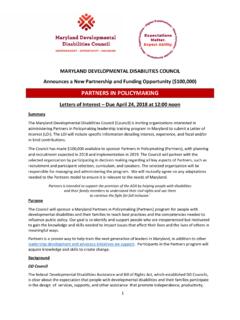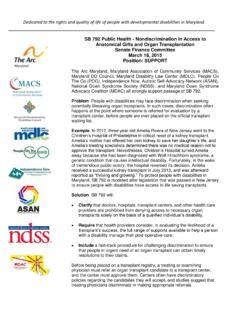Transcription of SB 943 Department of Legislative Services Maryland General ...
1 SB 943 Department of Legislative Services Maryland General Assembly 2017 Session FISCAL AND POLICY NOTE Enrolled Senate Bill 943 (Senator Smith, et al.) Education, Health, and Environmental Affairs Ways and Means Children With disabilities and Child Care Providers - Dispute Resolution Process This bill requires the Maryland State Department of Education (MSDE) to develop a dispute resolution process to be used by families of children with disabilities and child care providers for resolving complaints of discrimination based on a child s disability. In developing the specific components of the dispute resolution process, MSDE must convene a workgroup that includes specified entities, including MSDE s Office of Child Care and child care providers. By October 1, 2017, MSDE must submit to the General Assembly a report that includes the dispute resolution process developed by the workgroup and draft legislation or regulations to implement the dispute resolution process.
2 The bill takes effect June 1, 2017. Fiscal Summary State Effect: MSDE can handle the bill s requirements with existing budgeted resources. Any potential additional impact on MSDE will depend on the dispute resolution process developed. Local Effect: None. Small Business Effect: While the bill itself has no impact on small businesses, child care homes and child care centers may be affected by the dispute resolution process developed by MSDE as a result of the bill. SB 943/ Page 2 Analysis Bill Summary: The dispute resolution process must include (1) a process for investigating complaints; (2) a written report on the findings of an investigation; and (3) if there is a finding of discrimination on the basis of disability, a resolution to the complaint that includes an agreement with the child care provider detailing the requirements for remedying the violations and appropriate remedies that support children with disabilities , their families, and the child care provider.
3 The dispute resolution process may include an ombudsman, mediation, other appropriate informal resolution processes, or partnerships with other relevant State agencies. Current Law/Background: Since 1992, the Americans with disabilities Act (ADA) has prohibited discrimination on the basis of disabilities within child care programs. Child care providers must make reasonable modifications in their policies, practices, and procedures in order to accommodate the child with a disability unless the modification would fundamentally alter the nature of the program. Despite these requirements, the Maryland developmental disabilities council has previously indicated that quality and inclusive child care remain inaccessible to many children with disabilities and their families. The council conducted two surveys in August and September 2011 regarding access to child care.
4 Approximately 450 families and 480 child care providers responded, and a report was prepared in 2012 with the findings. According to the report, Barriers to Quality Child Care and Out of School Time Activities in Maryland , 75% of complaints about a child care provider not providing the Services , supports, or accommodations a child needed were not resolved. One of the recommendations within the report was to establish a dispute resolution process to investigate and address discrimination complaints against child care providers. The council and the Maryland Disability Law Center advise that the only remedy available to families who have a discrimination complaint under these circumstances is to file a complaint with the Office of Civil Rights in the Department of Justice. Due to the backlog of complaints, the office is not able to investigate the complaints in a timely manner.
5 Following this report, Chapters 565 and 566 of 2013 required the creation of a workgroup within MSDE to make recommendations to the State Superintendent regarding rules and regulations to establish a uniform and timely dispute resolution process to resolve claims of discrimination by child care providers based on a child s disability. MSDE advises that in response to Chapters 565 and 566, the State board adopted regulations requiring child care providers to complete at least three hours of approved training in complying with the ADA. MSDE further indicates that it receives very few of these types of complaints (four in the past year) and that when it is notified of an alleged issue, a licensing specialist conducts an inspection to determine if a violation of regulations has occurred. The SB 943/ Page 3 licensing specialist also meets with the provider to discuss the issue and provide possible ways to accommodate a child with a disability.
6 Additional Information Prior Introductions: None. Cross File: HB 456 (Delegate Kaiser, et al.) - Ways and Means. Information Source(s): Maryland State Department of Education; Maryland developmental disabilities council ; Maryland Disability Law Center; Department of Justice; Department of Legislative Services Fiscal Note History: First Reader - February 13, 2017 Third Reader - March 20, 2017 Revised - Amendment(s) - March 20, 2017 Enrolled - May 16, 2017 mm/rhh Analysis by: Jennifer K. Botts Direct Inquiries to: (410) 946-5510 (301) 970-5510










